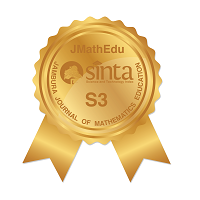The Effect of Student Adversity Quotient on Mathematics Test Scores Using PISA Questions
Abstract
Keywords
Full Text:
PDFReferences
I. Rukmana, M. Hasbi, and B. Paloloang, "Hubungan Adversity Quotient Dengan Hasil Belajar Matematika Siswa Kelas XI SMA Negeri Model Terpadu Madani Palu" J. Elektr. Pendidik. Mat. Tadulako, vol. 03, no. 03, pp. 325-333, 2016.
Sardiyanah, "Belajar dan Faktor yang Mempengaruhinya" Al-Qalam J. Kaji. Islam dan Pendidik., vol. 7, no. 1, pp. 174-196, 2015.
M. Syah, Psikologi Pendidikan Dengan Pendekatan Baru. Bandung: PT Remaja Rosda karya, 2013.
Rahmawati, K. H. Titisari, and S. Pawenang, "Learning Interest, Achievement Motivation, Learning Style, and Self-Reliance of Learning Effect on Student Achievement At Smp Batik Surakarta" Int. J. Econ. Bus. Account. Res., vol. 5, no. 3, pp. 1-11, 2021.
D. R. Suwardi, "Faktor-Faktor Yang Mempengaruhi Hasil Belajar Siswa Kompetensi Dasar Ayat Jurnal Penyesuaian Mata Pelajaran Akuntansi Kelas XI IPS di SMA Negeri 1 Bae Kudus" Econ. Educ. Anal. J., vol. 1, no. 2, p. 7, 2012.
P. G. Stoltz, Adversity Quotient Turning Obstacles into Opportunities. United States of America: John Wiley and Sons, 1997.
J. Greenberg, Behavior in Organizations, 10th ed., vol. 12, no. 2. United States of America: Pearson, 2011. doi: 10.2307/2391559.
W. Wangsadinata and G. Suprayitno, Roosseno: Jembatan dan Menjebatani. Jakarta: Yayasan Obor Indonesia, 2008.
U. Parvathy and P. M., "Relationship Between Adversity Quotient and Academic Problems Among Student Teachers" IOSR J. Humanit. Soc. Sci., vol. 19, no. 11, pp. 23-26, 2014.
M. Hulaikah, I. N. S. Degeng, S. Sulton, and F. D. Murwani, "The Effect of Experiential Learning and Adversity Quotient on Problem Solving Ability" Int. J. Instr., vol. 13, no. 1, pp. 869-884, 2020.
R. Pangma, S. Tayraukham, and P. Nuangchalerm, "Causal Factors Influencing Adversity Quotient of Twelfth Grade and Third-Year Vocational Students" J. Soc. Sci., vol. 5, no. 4, pp. 466-470, 2009.
I. Muhayana, N. Sridana, S. Prayitno, and A. Amrullah, "Pengaruh Adversity Quotient terhadap Hasil Belajar Matematika SMPN 1 Narmada Tahun Ajaran 2019 / 2020" GRIYA J. Math. Educ. Appl., vol. 1, no. 2, pp. 132-141, 2021.
B. Wahyu Purnomo and A. Fatwa Sari, "Literasi Matematika Siswa IPS dalam Menyelesaikan Soal PISA Konteks Saintifik" Mosharafa J. Pendidik. Mat., vol. 10, no. 3, pp. 357-368, 2021, [Online]. Available: http://journal.institutpendidikan.ac.id/index.php/mosharafa
OECD, "PISA: Programme for International Student Assessment" OECD. Accessed: Feb. 13, 2024. [Online]. Available: https://www.oecd.org/pisa/
D. A. Maharani and A. P. Abadi, "Kemampuan Literasi Matematis Dan Kemampuan Berfikir Tingkat Tinggi Serta Kaitannya Dengan Soal Matematika PISA" in Prosiding Seminar Nasional Matematika dan Pendidikan Matematika Sesiomadika 2019, Karawang: Universitas Singaperbangsa Karawang, 2019, pp. 850-857. [Online]. Available: http://journal.unsika.ac.id/index.php/sesiomadika
M. D. Siagian, "Pembelajaran Matematika Dalam Persfektif Konstruktivisme" NIZHAMIYAH J. Pendidik. Islam dan Teknol. Pendidik., vol. VII, no. 2, pp. 61-73, 2017.
R. Damayanti, "Profil Metakognisi Siswa dalam Menyelesaikan Masalah Segiempat Ditinjau dari Adversity Quotient" University of Jember, 2020.
OECD, "PISA Test" OECD. Accessed: Oct. 06, 2022. [Online]. Available: https://www.oecd.org/pisa/test/
S. Putrawangsa and U. Hasanah, "Analisis Capaian Siswa Indonesia pada PISA dan Urgensi Kurikulum Berorientasi Literasi dan Numerasi" EDUPEDIKA J. Stud. Pendidik. dan Pembelajaran, vol. 1, no. 1, pp. 1-12, 2022.
Sukriadi, A. Basir, and Rusdiana, "Pengaruh Kecerdasan Emosional terhadap Hasil Belajar Matematika Siswa pada Materi Sudut dan Garis Di Kelas VII MTs Normal Islam Samarinda" JPMI J. Pendidik. Mat. Indones., vol. 1, no. 2, pp. 65-73, 2016.
S. Siregar, Metode Penelitian Kuantitatif. Jakarta: Kencana Prenada Media Group, 2017.
N. Nurhayati and N. Fajrianti, "Pengaruh Adversity Quotient (AQ) dan Motivasi Berprestasi terhadap Prestasi Belajar Matematika" Form. J. Ilm. Pendidik. MIPA, vol. 3, no. 1, pp. 72-77, 2015, doi: 10.30998/formatif.v3i1.110.
Y. Suzana and I. Jayanto, Teori Belajar dan Pembelajaran. Malang: Literasi Nusantara, 2021.
R. D'Souza, "A Study of Adversity Quotient of Secondary School Students in Relation to Their School Performance and the School Climate" University of Mumbai, 2006.
N. Rathee and S. Sharma, "Adversity Quotient Among High School Students in Relation to Demographic Variables" Int. J. Humanit. Soc. Sci. Invent., vol. 7, no. 5, pp. 33-36, 2018.
DOI: https://doi.org/10.37905/jmathedu.v5i1.21022
Refbacks
- There are currently no refbacks.
Copyright (c) 2024 Jambura Journal of Mathematics Education

This work is licensed under a Creative Commons Attribution-NonCommercial 4.0 International License.
Jambura Journal of Mathematics Education has been indexed by:
EDITORIAL OFFICE OF JAMBURA JOURNAL OF MATHEMATICS EDUCATION |
 | Department of Mathematics, Universitas Negeri Gorontalo Jl. Prof. Dr. Ing. B. J. Habibie, Moutong, Tilongkabila, Kabupaten Bone Bolango, Gorontalo 96554, Indonesia |
 | Email: [email protected] |
 | +6285255745923 (Call/SMS/WA) |
 | Jambura Journal of Mathematics Education (JMathEdu | eISSN: 2721-7477) by Department of Mathematics Universitas Negeri Gorontalo is licensed under a Creative Commons Attribution-NonCommercial 4.0 International License. Powered by Public Knowledge Project OJS. |



















